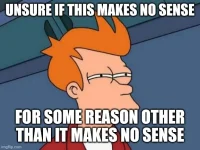- Joined
- May 29, 2025
- Messages
- 709
- Reaction score
- 396
- Gender
- Undisclosed
- Political Leaning
- Independent
On this forum we keep hearing from some people who speak in favor of heterosexuality, or at least in opposition to the alternatives. Now to be sure, many of their ways of doing things are mean-spirited, totalitarian, ignorant, and above all, where you'd expect them to be concerned, ineffective. But that is not to say that an interested person can't shift people toward heterosexual behavior: they can... however, they have to understand and respect LGBT+ in order to do it.
Now bear in mind:
* Over 57% of LGBT+ are bisexual.
* Over 80% of bisexuals are in a heterosexual relationship.
This suggests that around 45% of all the relationships by LGBT+ people are heterosexual, and another 11% easily could be.
So how would you affect these relationships? You have to figure something out about bisexuality that bisexual people might not know. It may seem as if the potential for relationships is symmetrical: either sex would work, and the ratio roughly reflects which people are available for relationships. But there's a competitive issue. Basically, a bisexual man can see a woman who is absolutely lovely, abundantly female and fertile, and think that she is "way out of his league" ... yet in practice, what he may not realize, is she is being ignored by most heterosexual men and getting into relationships with men he thinks are nothing compared to her. All because of one small detail he might not even notice: she's tall. As if he had a tape measure in his pocket! I mean, a bi man isn't going to feel strange meeting a lover's level gaze. (To be sure, all the equivalents should apply to women who, if heterosexual, also place strong emphasis on a man's height)
So if there are some people here who for some reason are fixated on the quixotic quest to make the world a straighter place, it's time to do some matchmaking. Find the heterosexual people who are being slighted and ignored because potential heterosexual partners tend to identify some feature that seems to look too much like the other sex. Then try to make it easier for bisexual people to notice those people. The rest should be mutually satisfactory for all involved, even the busybodies.
In sheer numerical terms, I think this approach would be vastly (probably infinitely) more effective for promoting heterosexuality than all the bullying and snubbing and sniping at legal rights in the world. And it's not evil. Note that this may even be a reason why LGBT+ evolved: to make sure that reproductive potential isn't wasted due to everyone having too strict of a sexual preference.
Now bear in mind:
* Over 57% of LGBT+ are bisexual.
* Over 80% of bisexuals are in a heterosexual relationship.
This suggests that around 45% of all the relationships by LGBT+ people are heterosexual, and another 11% easily could be.
So how would you affect these relationships? You have to figure something out about bisexuality that bisexual people might not know. It may seem as if the potential for relationships is symmetrical: either sex would work, and the ratio roughly reflects which people are available for relationships. But there's a competitive issue. Basically, a bisexual man can see a woman who is absolutely lovely, abundantly female and fertile, and think that she is "way out of his league" ... yet in practice, what he may not realize, is she is being ignored by most heterosexual men and getting into relationships with men he thinks are nothing compared to her. All because of one small detail he might not even notice: she's tall. As if he had a tape measure in his pocket! I mean, a bi man isn't going to feel strange meeting a lover's level gaze. (To be sure, all the equivalents should apply to women who, if heterosexual, also place strong emphasis on a man's height)
So if there are some people here who for some reason are fixated on the quixotic quest to make the world a straighter place, it's time to do some matchmaking. Find the heterosexual people who are being slighted and ignored because potential heterosexual partners tend to identify some feature that seems to look too much like the other sex. Then try to make it easier for bisexual people to notice those people. The rest should be mutually satisfactory for all involved, even the busybodies.
In sheer numerical terms, I think this approach would be vastly (probably infinitely) more effective for promoting heterosexuality than all the bullying and snubbing and sniping at legal rights in the world. And it's not evil. Note that this may even be a reason why LGBT+ evolved: to make sure that reproductive potential isn't wasted due to everyone having too strict of a sexual preference.




